Stop it card game
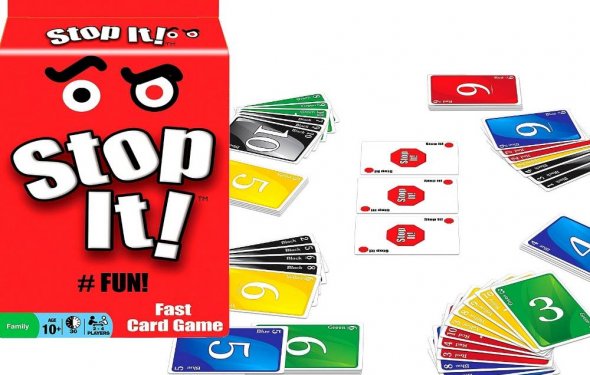
 Recently, I've been playing Android: Netrunner, a living card game put out by FFG. I say "playing, " but you should read that as "obsessing over, " because once you play this game a few times, it hooks you like a neural interface.
Recently, I've been playing Android: Netrunner, a living card game put out by FFG. I say "playing, " but you should read that as "obsessing over, " because once you play this game a few times, it hooks you like a neural interface.
Android: Netrunner is a two-player cyberpunk game featuring asymmetric gameplay. One player takes the role of one of four amoral megacorporations, and their opponent takes the role of a hacker—named "runner" in this setting—in one of three factions. The corporation, in order to conduct business, must score several agendas over the course of the game, installing them face-down and advancing them. Advancing uses time and money, which are called clicks and credits, because this is the future. Some of these agendas are innocuous, and some are much darker. The runner, on the other hand, must only access these agendas, exposing them to the wider world, to score them.
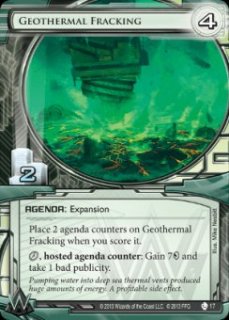
To keep this from happening, the corporation protects its assets by installing ICE, face down. ICE can end the runner's hacking "run, " trace the runner's location, or damage the runner, as well as other, more complicated effects. While face-down, the ICE are inactive—when the runner tries to run the server, the corporation can "rez" the ice, paying an amount specified on the card. The runner can keep these effects from happening by using programs that break ICE subroutines, called icebreakers. Much like rezzing ice, using icebreakers takes money.
Since so much of A:NR involves spending money to deal with threats, a large part of the game involves trying to get the other player to spend theirs first. To help with that, the corporation also has assets, which are installed like agendas and can be protected by ice. These typically give the corporation a solid advantage, but can be trashed by runners who access the card and pay the trash cost. The corporation might place this behind some ice, and bluff that the card is an agenda, prompting a run.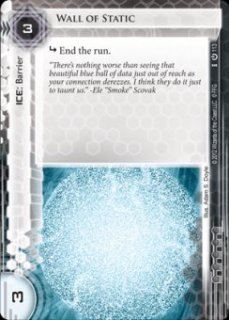 Since ICE stays around after a run, this costs the corporation little, but the runner might expend most of their resources to find nothing but an ambush .
Since ICE stays around after a run, this costs the corporation little, but the runner might expend most of their resources to find nothing but an ambush .
The runner, on the other hand, can run everywhere. They can run on the corporations hand, its deck, its discard pile, or any of its installed agendas or assets, accessing cards unless the corporation rezzes ice to keep the runner out. This type of pressure keeps the corporation tied up figuring out where to spend its limited credits. If there's an agenda in hand, can it gamble that the top card of the deck isn't an agenda? Or should it spend some of its credits towards protecting the deck, possibly leaving the hand open to assault?
These decisions add up, and each card played increases the pressure. The game develops like a mix between a strategy game and Texas-hold-'em, bluffing and calling while advancing your own position. But while the game mechanics are amazing, the real draw, for me, is the story.
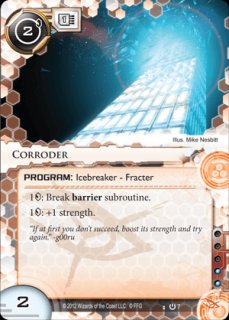

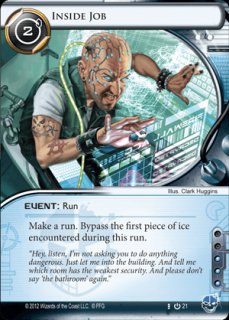
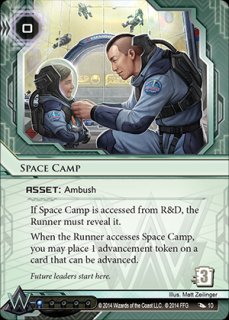
Stop the Bus is a simple card game, common in England, similar to Thirty-one with the hand rankings from Brag. Three of a kind, (a prial), is the best hand followed by a running flush, then a run, then a flush, then a pair followed by a high card. If a hand is otherwise similar then the card is ranked by high card or high pair, then by middle...

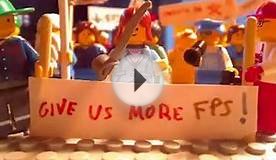
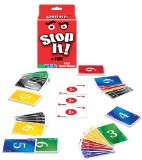
|
Winning Moves "Stop It" Card Game Toy (Winning Moves)
|